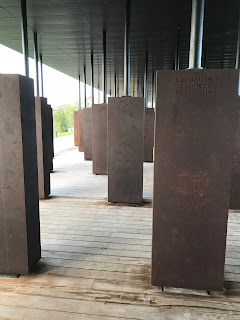rights tour in Alabama and Mississippi. I replay conversations and revisit some of the sites. I am there all over again.
 Last night in the darkness, the quiet, the dead of night, I saw the 800 monuments, each one a six-foot rectangular steel box hanging from the ceiling like upturned caskets. Each one engraved with the name of a county and the names, when known, of African American victims of lynching. More than 4000 names.
Last night in the darkness, the quiet, the dead of night, I saw the 800 monuments, each one a six-foot rectangular steel box hanging from the ceiling like upturned caskets. Each one engraved with the name of a county and the names, when known, of African American victims of lynching. More than 4000 names. Located in Montgomery, Alabama, this is the National Memorial for Peace and Justice, better known as the Lynching Memorial, which opened in April, 2018. In the words of one writer, "it is not just a memorial; it is a confrontation."

At first one walks through the rows created by these structures. I stopped often to read the names. Sometimes only one name was listed, but sometimes, as in the case of Carroll County, Mississippi, twenty-nine names were listed. How can that be? Who has that much fear and hate and anger in their being? Too many, apparently.

As one continues to walk through the open-air memorial, the stark wooden floor begins to slope until the monuments are hanging above our heads. Think about that image. That physical sensation.
On the last day of our trip we visited the National Civil Rights Museum in Memphis, which includes the Lorraine Motel where Martin Luther King, Jr. was assassinated. While sitting in one of the exhibit rooms, I chatted (such a light word) with a young woman from Birmingham. An African American woman. She asked me where I was from, and I told her about our tour. She wanted to know if we had been to the new memorial in Montgomery and what it was like. I told her as best I could, and she said she just didn't think she could go there. I wanted to hug her, but instead, I merely touched her arm, saying, as we looked into each other's eyes, this young black woman and this old white woman, "You will know when you are ready."
I've been thinking about that brief connection in which she dared to be vulnerable, and I wish I had said, "You will know when you are ready to push yourself, to open yourself to the pain you will feel." I wish I could have heard her story, what kind of trauma she carries. I wish I could hold her hand when she is finally able to walk through that memorial. She may not have a specific lynching story in her personal history, but she holds within the trauma from all the evil done to her ancestors. As a white person, I am just beginning to realize that we are all psychologically damaged because of this violence.
Here's a story that proves that point. You may have read the article in the Washington Post. Read here. Senator Cindy Hyde-Smith (R, Mississippi) responded to praise from a Mississippi cattle rancher by saying, "If he invited me to a public hanging, I'd be on the front row." Yes, she really said that, and she made it even worse by trying to explain herself that what she said was an "exaggerated expression of regard."
I think anyone running for public office should spend a day at the National Memorial for Peace and Justice.
The memorial is rich, intense with a variety of ways to explore what Ida B. Wells, to whom the garden at the memorial is dedicated, called "our national crime." Yes, this is a place to learn about a history that has been ignored, but it is also holy ground in which to explore one's place in this history and how the trauma of lynching, of inequality continues to affect our life as American citizens today.
An Invitation
What images, words make you wake up in the middle of the night?









